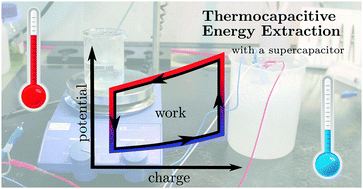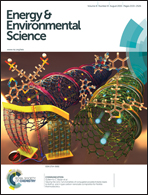Heat-to-current conversion of low-grade heat from a thermocapacitive cycle by supercapacitors†
Abstract
Thermal energy is abundantly available, and especially low-grade heat is often wasted in industrial processes as a by-product. Tapping into this vast energy reservoir with cost-attractive technologies may become a key element for the transition to an energy-sustainable economy and society. We propose a novel heat-to-current converter which is based on the temperature dependence of the cell voltage of charged supercapacitors. Using a commercially available supercapacitor, we observed a thermal cell-voltage rise of around 0.6 mV K−1 over a temperature window of 0 °C to 65 °C. Within our theoretical model, this can be used to operate a Stirling-like charge–voltage cycle whose efficiency is competitive to the most-efficient thermoelectric (Seebeck) engines. Our proposed heat-to-current converter is built from cheap materials, contains no moving parts, and could operate with a plethora of electrolytes which can be chosen for optimal performance at specific working temperatures. Therefore, this heat-to-current converter is interesting for small-scale, domestic, and industrial applications.


 Please wait while we load your content...
Please wait while we load your content...